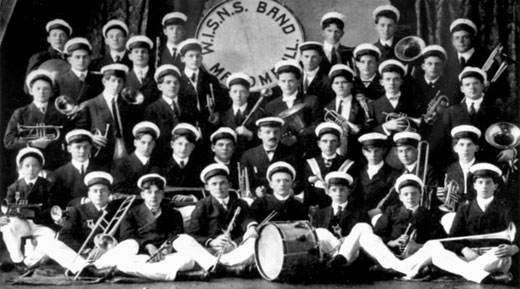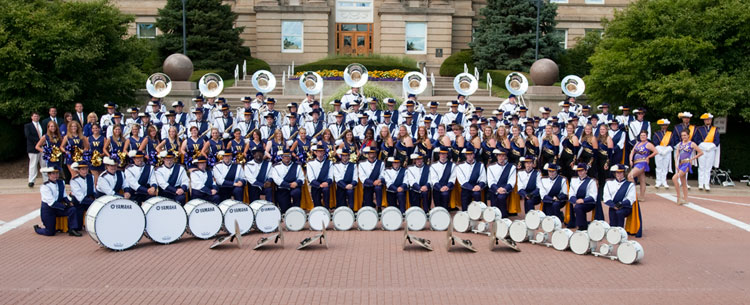Bands Alumni
WIU Home > COFAC > Bands > Band Alumni
Program History

The Western Illinois State Normal School Band was first organized in 1904 by the manual arts teacher, Louis H. Burch. Included in the first band at Western were two notable Macomb figures, Carle Crabb, later a newspaperman, and T. Mac Downing, later a state legislator. The band was not open to women, for whom the uniforms and pants were not suitable attire. In the same year, Burch also formed the WISNS Orchestra, in which he played first cornet.
By 1932, the Western Illinois State Teachers College Band had forty-three members - a record number. The band director was Walter Eller, and the drum major was John Fuhr. The stylish uniforms included purple capes trimmed in gold. Women were permitted in the band by the early 1930s; however, the played only at concerts.
Before serving in World War I, band director Walter Eller has taught at River Falls State Normal School in Wisconsin, where he wrote a fight song called "the Falls March." In 1935, he wrote the words and music of Western's fight song, "We're Marching On," which was officially dedicated at the Homecoming parade that year. It has been performed ever since at athletic events.

In 1936, Clifford Julstrom arrived at Western and organized the Academy Band. Julstrom, had received a bachelors degree from Augustana College and a masters degree from the Eastman School of Music. He had played in several orchestras and had taught at Hastings College before coming to Western. At the end of the decade, he replaced Karl Crilly as Director of the WISTC Orchestra.
In 1978, Dale Hopper became the Director of Bands at Western Illinois University. Hopper received his bachelors and masters degrees from the University of Illinois at Urbana-Champaign. Prior to his appointment at WIU, Hopper was Director of Bands and Music Supervisor at Herscher High School in Illinois. He served 20 years as director of bands, receiving highest acclaim for the Marching Leathernecks Band and the Jazz Studio Orchestra (JSO). He took the JSO on numerous European tours and directed the production of four compact discs, including the 1994 Grammy-nominated "Jazz at the Crossroads" and the CD titled "The Third Degree," which earned a four-star review in DownBeat Magazine.
His professional career included composing, arranging and writing. Hopper composed "Entry Into Olympia," the official commissioned music for the 1984 International Games for the Disabled. His arrangement of "Georgia" is a Marching Leathernecks tradition at home football games.
Hopper had more than 60 publications to his credit in addition to his best-selling book "Corps Style Marching" (1977) and "The Drill Designer's Idea Book" (1988). He received the Benny Goodman Award for outstanding jazz educator in 1970; was named Outstanding Marching Band Director in the Midwest in 1974; and was an Illinois Teacher of the Year candidate in 1976, during his 14-year tenure in the public schools.
In 1985, Dr. Jon R. Dugle became the director of the Symphonic Wind Ensemble, the showcase concert wind group at Western. Jon Dugle received his Bachelors, masters and doctorate degrees from the University of Illinois at Urbana-Champaign, and marched along side of Dale Hopper when in the U of I marching band together. Before his hire at WIU, Jon Dugle taught for 21 years at Danville High School in East-Central Illinois.
Under his leadership, the Symphonic Wind Ensemble has toured extensively throughout the United States and annually presents a nine-concert tour in the Midwest. Performances under Jon Dugle have included the Music Educators National Conference, the Illinois Music Educators Association All-State Conference, and the College Band Directors National Association Conference. From the late 70s to the turn of the century, Dugle and Hopper built a band program that has become recognized on an International level.


Connect with us: